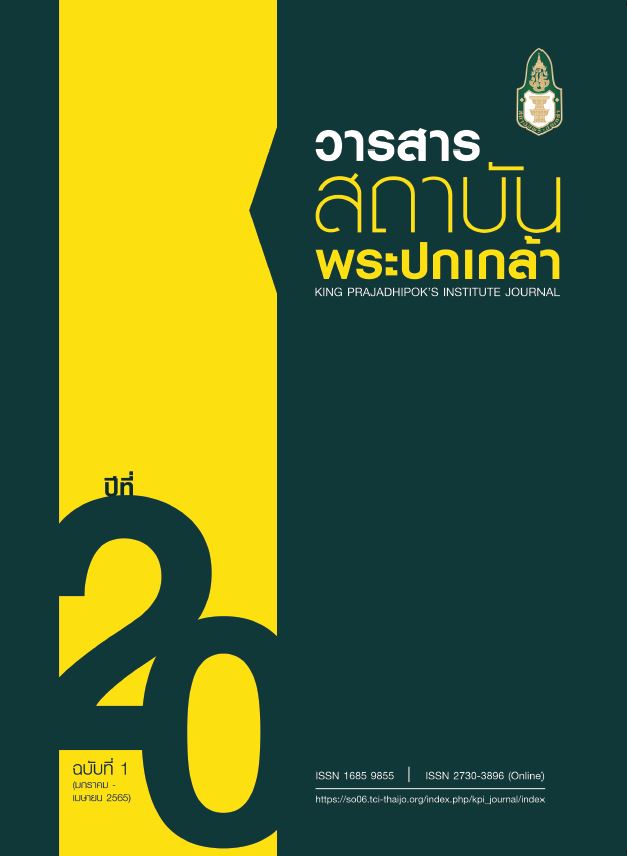The Internet Content Regulation by the Government of Thailand: Deep State and the Internet in Thailand
Main Article Content
Abstract
The objectives of this research were 1) to study and analyze the concepts and ideas of the governance of Internet contents through its governing mechanisms and the state’s actions, both directly and indirectly; and 2) to predict trends and offer suggestions in governing Internet contents in the future. This study employed qualitative research based on the information from documentary sources and fieldwork research using in-depth interviews. The subjects were selected by purposive random sampling method with four groups of key informants: 1) representatives of governmental regulators; 2) Internet users, mass media, and auditors in civil society organizations; 3) Internet service providers and social media; and 4) academic experts on Internet issues. The analysis is descriptive. The research results showed that the state employed various strict governing mechanisms to surveil Internet contents by using laws and indirect regulations that shift political violence from the real world to cyberspace. From 2005 to 2021, the surveillance of Internet contents has focused on several issues such as the stability of the government, the military junta, the state of emergency, and lèse-majesté law. However, there has been increasing awareness regarding freedom of expression and the use of the Internet among Thai netizens. The concept and idea of Internet content regulation by the Thai state has five key elements: (1) deep state, (2) law, (3) market, (4) social norms, (Thainess myth), and (5) the Internet architecture/structure in Thailand. As a result, the Internet in Thailand cannot be a public sphere for democratization.
Article Details

This work is licensed under a Creative Commons Attribution-NonCommercial-NoDerivatives 4.0 International License.
@ 2020 King Prajadhipok's Institute The Government Complex Commemorating All Right Reserved.
References
ภาษาไทย
จันจิรา สมบัติพูนศิริ. (ม.ป.ป.). กองกำลังไซเบอร์ ด้านมืดของภาคประชาสังคม และพื้นที่ประชาธิปไตย. สืบค้นจาก https://www.the101.world/the-rise-of-cyber-troops/#
ชาญชัย ชัยสุขโกศล. (2553). อำนาจเชิงโครงสร้างของระบบเทคโนโลยี : ศึกษากรณีอินเทอร์เน็ตไทย ช่วงก่อนรัฐประหาร 2549. สืบค้นจาก https://chaisuk.wordpress.com/
/11/30/structural-power-of-thai-internetth/
ณัฐวรรธน์ แก้วจู. (2564). ย้อนมอง พ.ร.บ.คอมพิวเตอร์ฯ: การจำกัดเสรีภาพผ่านความคลุมเครือของตัวบท. สืบค้นจาก https://tlhr2014.com/archives/38052#_ftn2
เดอะแมตเตอร์. (2563). เปิดรายงานปฏิบัติการ IO ในทวิตเตอร์ หลังพบ 900 กว่าบัญชีที่เชื่อว่าเป็น IO และเชื่อมโยงกับกองทัพบก. สืบค้นจาก https://thematter.co/brief/
/125769
เดอะสแตนดาร์ด. (2563). ‘อวยกองทัพ โจมตีอนาคตใหม่’ Stanford เปิดรายงานวิเคราะห์ปฏิบัติการ IO กองทัพบกจากรายงาน Twitter. สืบค้นจาก https://thestandard.co/stanford-analyst-io-work-through-twitter/
ทีเอ็นเอ็นออนไลน์. (2565). “ดีอีเอส”เชื่อมั่น ครม.อนุมัติตั้งศูนย์ปราบข่าวปลอม เสริมความร่วมมือข้ามหน่วยงาน. สืบค้นจาก https://www.tnnthailand.com/news/social/103922/
บีบีซีไทย. (2563). ไอโอ : คณะก้าวหน้าเปิดโปงข้อมูลเครือข่ายปฏิบัติการข่าวสารกองทัพ ด้านเอกชนแถลงโต้ชี้ข้อมูลบิดเบือน. สืบค้นจาก https://www.bbc.com/thai/thailand-55145803
. (2564). พล.อ.ประยุทธ์ลงนามยกเลิกข้อกำหนด 29 ที่ศาลแพ่งสั่งระงับการบังคับใช้หลังตัวแทนสื่อยื่นฟ้อง. สืบค้นจาก https://www.bbc.com/thai/thailand-58053739
. (2565). ข่าวปลอม: ร่างระเบียบสำนักนายกฯ ปราบเฟคนิวส์ ความพยายามล่าสุดของรัฐบาลในการกลบเสียงวิจารณ์ ?. สืบค้นจาก https://www.bbc.com/thai/thailand-60239430
ประชาชาติธุรกิจออนไลน์. (2565). ผุดศูนย์ปราบ Fake news ทั่วประเทศ ครม.ไฟเขียวร่างระเบียบสำนักนายก. สืบค้นจาก https://www.prachachat.net/politics/news-855679
พัทธมน วงศ์นาค. (2560). การกำกับดูแลเนื้อหาอินเทอร์เน็ตของรัฐไทย: แนวคิด พัฒนาการ และแนวโน้ม. (วิทยานิพนธ์ปริญญามหาบัณฑิต) มหาวิทยาลัยธรรมศาสตร์, คณะรัฐศาสตร์,สาขาการปกครอง. กรุงเทพฯ.
พิรงรอง รามสูต, รณะนันทน์ และนิธิมา คณานิธินันท์. (2547). รายงานวิจัยฉบับสมบูรณ์เรื่อง การกำกับดูแลเนื้อหาอินเทอร์เน็ต. กรุงเทพฯ: สำนักงานกองทุนสนับสนุนการวิจัย.
เฟซบุ๊ก. (2565). มาตรฐานชุมชนคืออะไร. สืบค้นจาก https://www.facebook.com/
community/using-key-groups-tools/understanding-community-standards/
มูลนิธิสถาบันวิจัยเพื่อการพัฒนาประเทศไทย. (2559). รายงานผลการศึกษาฉบับสมบูรณ์ (Final Report) โครงการศึกษาวิจัยการปฏิรูปสื่อ เล่มที่ 5 การกำกับดูแลเนื้อหาของสื่อใหม่ (New Media). กรุงเทพฯ: สำนักงานคณะกรรมการกิจการกระจายเสียง กิจการโทรทัศน์และกิจการโทรคมนาคมแห่งชาติ.
วีรวิชญ์ เลิศรัตน์ธำรงกุล และสุรีย์ลักษณ์ รักษาเคน. (2561). เสรีภาพในการแสดงความคิดเห็นตามรัฐธรรมนูญบนเครือข่ายสังคมออนไลน์ภายใต้การบังคับใช้พระราชบัญญัติว่าด้วยการกระทำความผิดเกี่ยวกับคอมพิวเตอร์ ฉบับที่ 2 พ.ศ. 2560. วารสารวิชาการและวิจัยมหาวิทยาลัยภาคตะวันออกเฉียงเหนือ, 8(2), 26-41.
วุฒิพล วุฒิวรพงศ์ และกิ่งกาญจน์ จงสุขไกล. (2562). พัฒนาการของช่องทางในการแสดงออกทางการเมืองในสื่อออนไลน์ ช่วง พ.ศ. 2560-2557. วารสารด้านการบริหารรัฐกิจและการเมือง, 8(3), 147-167.
ศูนย์ข้อมูลคดี สำนักงานศาลยุติธรรม. (2562). สถิติความผิดต่อ พ.ร.บ.ว่าด้วยการกระทำความผิดเกี่ยวกับคอมพิวเตอร์ พ.ศ. 2550. สืบค้นจาก https://oppb.coj.go.th/th/content/
category/detail/id/8/cid/2101/iid/166875
สวพ.91. (2563). กระทรวงดิจิทัลเพื่อเศรษฐกิจและสังคม แถลงสรุปตัวเลข ผู้ใช้โซเชียลมีเดีย กระทำผิด ‘พ.ร.บ.คอมพิวเตอร์ฯ’–‘พ.ร.ก.ฉุกเฉินฯ’ ระหว่าง สถานการณ์การชุมนุม ระหว่าง 13-18 ต.ค.63. สืบค้นจาก https://fm91bkk.com/fm91-news0119102563-2
สำนักงานสถิติแห่งชาติ กระทรวงดิจิทัลเพื่อเศรษฐกิจและสังคม. (2564ก). สรุปผลที่สำคัญ สำรวจการมีการใช้เทคโนโลยีสารสนเทศและการสื่อสารในครัวเรือน พ.ศ. 2563. กรุงเทพฯ: สำนักงานสถิติแห่งชาติ กระทรวงดิจิทัลเพื่อเศรษฐกิจและสังคม.
. (2564ข). สำรวจการมีการใช้เทคโนโลยีสารสนเทศและการสื่อสารในครัวเรือน พ.ศ. 2564 (ไตรมาส 2). กรุงเทพฯ: สำนักงานสถิติแห่งชาติ กระทรวงดิจิทัลเพื่อเศรษฐกิจและสังคม.
อินโฟเควสท์. (2564). ดีอีเอส เดินหน้าเร่งคลอดแนวทางกำกับดูแลผู้ใช้สื่อ Social Media สกัดข้อมูลเท็จ. สืบค้นจาก https://www.infoquest.co.th/2021/89212
ไอลอว์. (2563). พ.ร.บ.คอมพิวเตอร์ฯ มาตรา 14(3) เวอร์ชั่นใหม่ความผิดหมิ่นกษัตริย์ฯ แทนที่
ม.112. สืบค้นจาก https://freedom.ilaw.or.th/en/node/793
ภาษาอังกฤษ
Corbin, J., & Strauss, A. (2015). Basics of Qualitative Research (4rd ed.): Techniques and Procedures for Developing Grounded Theory. Los Angeles, CA.: SAGE Publications, Inc.
Deibert, Ronald, & Rohozinski, Rafal. (2010a). Liberation vs. Control: The Future of Cyberspace. Journal of Democracy, 21(4), 43-57.
. (2010b). Beyond Denial: Introducing Next-Generation Information Access Controls. In Ronald Deibert, et al. (Eds.), Access Controlled: The Shaping of Power, Rights, and Rule in Cyberspace. Massachusetts: The MIT Press.
Giacomello, G. (2008). National Governments and Control of the Internet: A Digital Challenge. London: Routledge.
Glaser, B. G. (2004). Remodeling Grounded Theory. FORUM: QUALITATIVESOCIAL RESEARCH, 5(2), 1-22.
Goldstein, J.A., Sinpeng A., Bush D., Ewald R., John J., Thiel D. (2020). Cheerleading Without Fans: A Low-Impact Domestic Information Operation by the Royal Thai Army. California, USA : Stanford Internet Observatory.
Gomez, James. (2004). Dumbing Down Democracy: Trends in Internet Regulation, Surveillance and Control in Asia. Pacific Journalism Review, 10(2), 130-150. doi:10.24135/PJR.V10I2.810
Howard, Philip. (2010). The Digital Origins of Dictatorship and Democracy: Information Technology and Political Islam. New York: Oxford University Press.
Kalathil, Shanthi, & Boas, Taylor. (2003). Open Networks, Closed Regimes: The Impact of the Internet on Authoritarian Rule. Washington: Carnegie Endowment for International Peace.
Lessig, Lawrence. (1999). Code and Other Laws of Cyberspace. New York: Basic Books.
Mérieau, Eugénie. (2016). Thailand’s Deep State, Royal Power and the Constitutional Court (1997–2015). Journal of Contemporary Asia, 46(3), 445-466. doi:10.1080/00472336.2016.1151917
Morozov, Evgeny. (2011). The Net Delusion: The Dark Side of Internet Freedom. New York: Public Affairs.
Rodan, Garry. (2013). The Internet and Political Control in Singapore. Political Science Quarterly, 113(1), 63-89. doi: 10.2307/2657651
Ruijgrok, K. (2017). From the Web to the Streets: Internet and Protests under Authoritarian Regimes. Democratization, 24(3), 498-520.
doi: 10.1080/13510347.2016.1223630
Schleffer, G., & Miller, B. (2021). The Political Effects of Social Media Platforms on Different Regime Types. Texas National Security Review, 4(3), 77-103.
doi: 10.26153/tsw/13987
Tkacheva, O., Schwartz, L. H., Libicki, M. C., Taylor, J. E., Martini, J., & Baxter, C. (2013). Internet Freedom and Political Space. Santa Monica, CA.: RAND Corporation. Retriveved from http://www.jstor.org/stable/10.7249/
j.ctt4cgd90
TwitterSafety. (2020). Disclosing Networks to Our State-linked Information Operations Archive. Retrieved from https://blog.twitter.com/en_us/topics/
company/2020/disclosing-removed-networks-to-our-archive-of-state-linked-information#
Wacker, Gudrun. (2003). The Internet and Censorship in China. In Christopher Hughes and Gudrun Wacker (Eds.), China and the Internet: Politics of the Digital Leap Forward. London: Routledge Curzon. doi: 10.4324/9780203417713
You, Y., & Wang, Z. (2020). The Internet, Political Trust, and Regime Types: A Cross-national and Multilevel Analysis. Japanese Journal of Political Science, 21(2), 68-89. doi:10.1017/S1468109919000203


